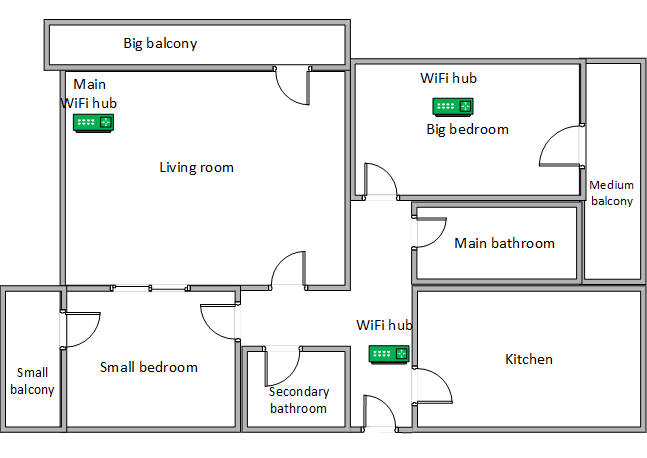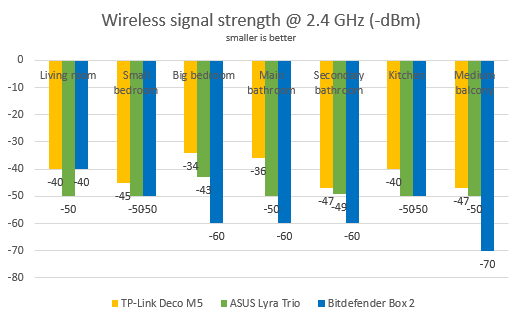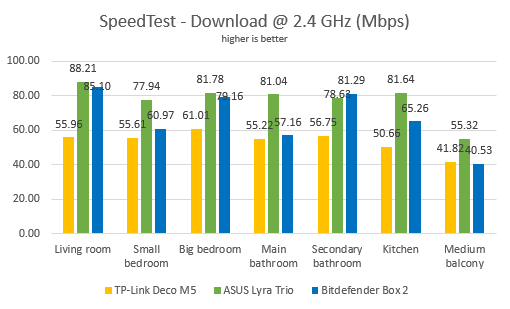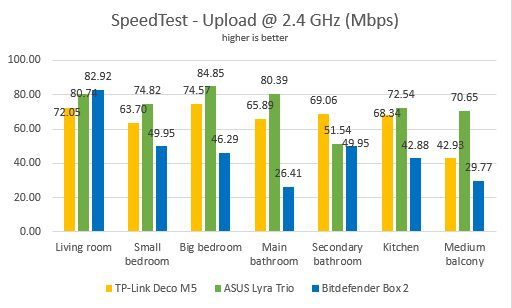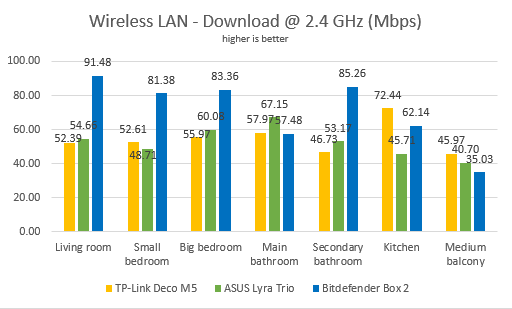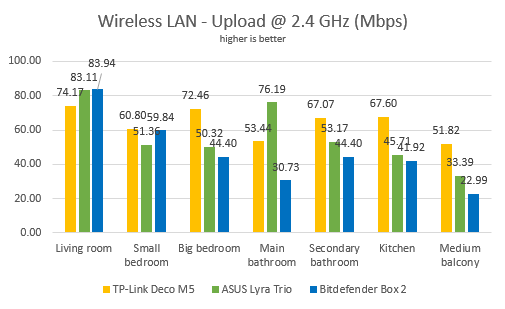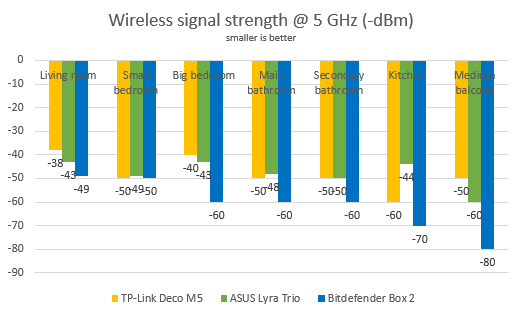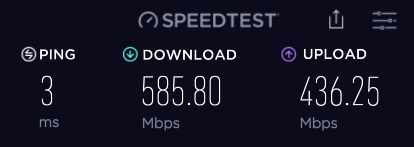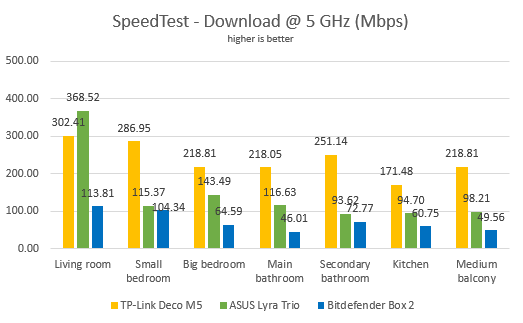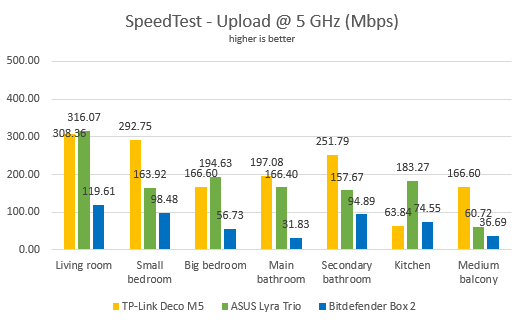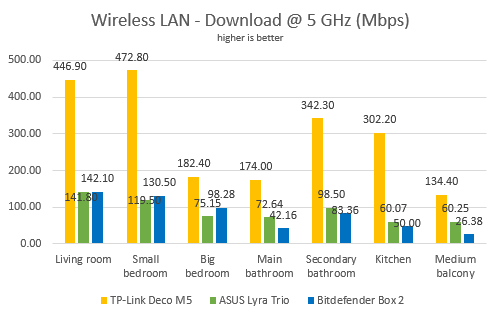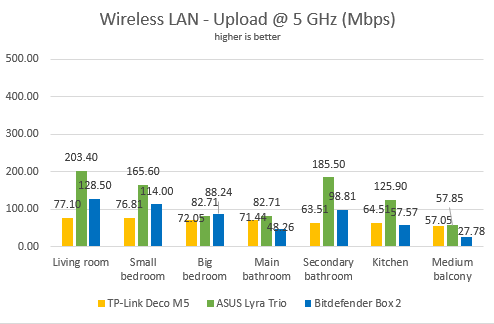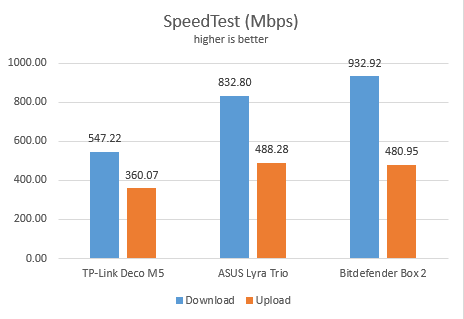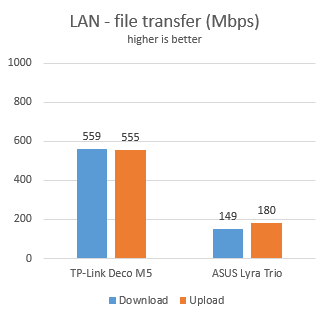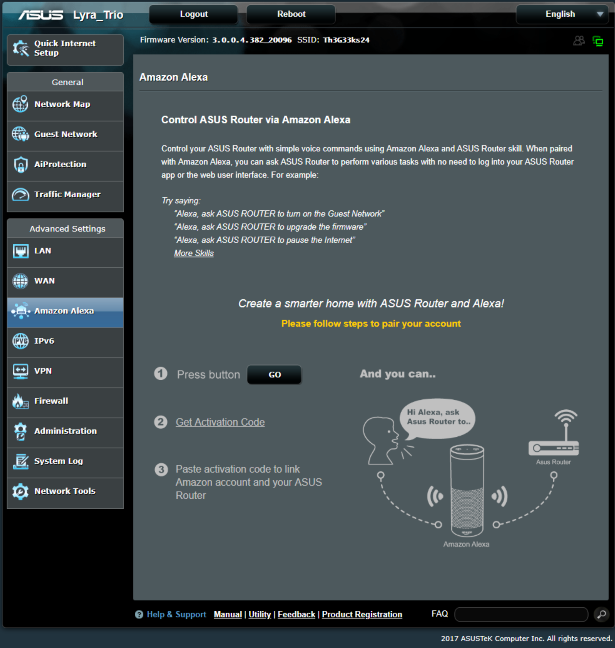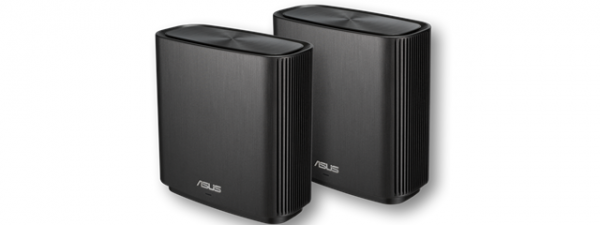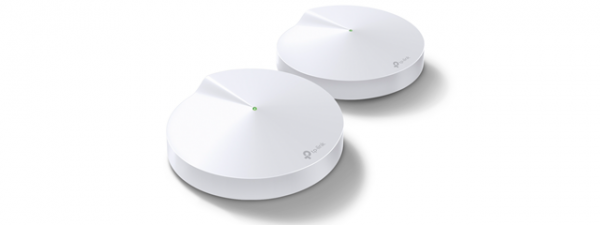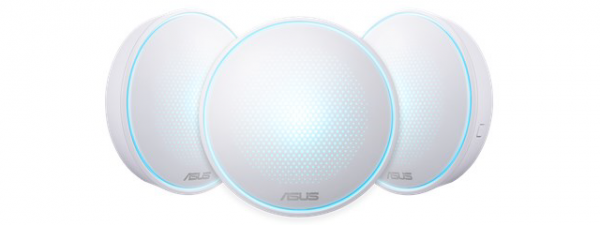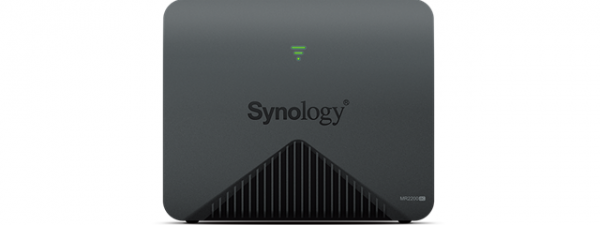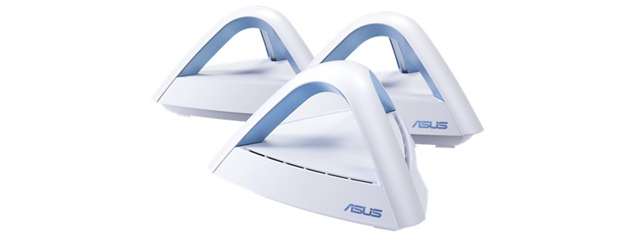
Wireless network performance
First, let's take a look at the apartment that was used in our testing and how it is set up. You can see that the main ASUS Lyra Trio hub is placed in the living room. When using wireless routers, the signal strength is not that high in rooms like the Kitchen and the Medium balcony. To improve the coverage of the network, we placed the second hub in the Big Bedroom. As a result, the Medium balcony should benefit from stabler WiFi. Then, the third hub was placed near the entrance to the Kitchen, to improve the coverage there too.
Our testing was done using a fast 1 Gigabit Internet connection that's capable of uploads on the internet of up to 500 Mbps. We used an HP Spectre 13 laptop for our measurements.
We decided to compare the ASUS Lyra Trio with TP-Link Deco M5 (a competing whole-home mesh WiFi system), and Bitdefender Box 2 (an AC1900 wireless router with advanced security built-in).
We started by evaluating the 2.4 GHz wireless network and measured the signal strength offered in each room, using a tool named inSSIDer. You can see that the signal strength offered by ASUS Lyra Trio was constant in all rooms, with minor variations. This is what you should get from a mesh WiFi.
Then, we used SpeedTest to see how fast the internet connection is when using the 2.4 GHz wireless frequency. ASUS Lyra Trio was faster than TP-Link Deco M5 in all rooms.
The same was true when measuring the upload speed with SpeedTest.
Next, we used the PassMark Performance test to transfer data between two computers connected to the network, using the 2.4 GHz wireless frequency. This time, the differences between ASUS Lyra Trio and TP-Link Deco M5 were much smaller, and there was no clear winner between the two.
The same story was noticed when evaluating the upload speed over the network when using the 2.4 GHz band.
When using the 2.4 GHz wireless frequency, ASUS Lyra Trio offers constant signal strength in its area of coverage. The speed you get is good, similar to that of other mesh WiFi systems.
Next, we analyzed the performance offered by the 5GHz wireless network. First, we looked at the evolution of the signal strength, from room to room. Again, ASUS Lyra Trio delivered stable signal strength that did not deteriorate as much as when using a wireless router.
Next, we ran SpeedTest to see how fast the internet connection is on the 5GHz band. To see the maximum potential of ASUS Lyra Trio, we used the world's only PCI-E network card with support for 4x4 MU-MIMO. When we used this network card, we obtained a maximum speed of 585.80 Mbps for the download, and of 436.25 Mbps for the upload.
We also measured the download speed with SpeedTest, in every room of our test apartment, using our test laptop. When looking at the download speed, ASUS Lyra Trio was very fast in the room where the main hub was placed, and average in all other rooms. However, as expected, it delivered better speed and coverage, when compared to a wireless router.
When evaluating the upload speed, ASUS Lyra Trio performed better, in some rooms from our test apartment.
For the last measurements on the 5GHz wireless network, we used the PassMark Performance test to transfer data between two computers connected to the network. The download speed offered by ASUS Lyra Trio was average, but more constant when compared to a wireless router.
The upload speed was surprisingly faster than the download speed.
When using the 5 GHz wireless band, ASUS Lyra Trio delivers constant speed and coverage. However, it tends to be faster at uploading data, than at downloading it.
Wired network performance
To test the quality of the wired Ethernet connection, we used a desktop PC equipped with an AMD Ryzen 5 1600 processor, running at 3.20GHz, 16GB of RAM and a very fast Samsung 850 Pro 512GB SSD, and a Lenovo IdeaCentre 610s mini PC.
We measured the speed of the internet connection when using a 1 Gbps Ethernet cable, using SpeedTest. ASUS Lyra Trio performed well and was faster than TP-Link Deco M5. The measurement was made on the desktop PC, connected to the main ASUS Lyra Trio hub.
Then, we ran a network transfer between the two computers, each connected with an Ethernet cable to a different ASUS Lyra Trio. Since the Lyra Trio hubs were connected to each other wirelessly, the transfer was mediated through WiFi. We used PassMark Performance test for this measurements. As you can see, the transfer speeds we got were rather unimpressive.
You can enjoy 1 Gbps connections just on one Ethernet port, on the central ASUS Lyra Trio station. On all the others you get less, unless you connect all Lyra Trio hubs, using Ethernet cables.
Extra features
ASUS Lyra Trio offers some exciting extra features:
- AiProtection - the ASUS Lyra Trio can automatically block malicious websites when they are accessed from any device. You also get a Two-Way Intrusion Prevention System that prevents attacks coming from the internet. Unfortunately, there is no vulnerability protection available, like on premium router wireless from ASUS.
- Family Members - allows you to set a schedule for internet access as well as content filters for your children and the devices that they use. Parents will appreciate this feature. What we found strange though is that this feature can be set up only when using the mobile app. There is no mention of it in the web user interface that is available for administering the ASUS Lyra Trio.
- Guest network - you can enable a guest WiFi network for people visiting your home. From the mobile app, you can only set time limits for guests.
- Traffic Manager (Adapting QoS) - a user-friendly service that allows you to set prioritization rules for different kinds of traffic. For example, if you are a gamer, you can prioritize online gaming versus other types of traffic.
- VPN Server - this can be enabled only in the web-based administration user interface. You can set the ASUS Lyra Trio to work as a VPN server, using the PPTP and OpenVPN protocols.
- Network Tools - a set of troubleshooting tools that help you figure out how to solve networking problems. They can be accessed and used only from the web-based administration user interface.
- Amazon Alexa - if you use Alexa, you can control ASUS Lyra Trio through voice commands like: "Alexa, ask ASUS Router to turn on the Guest network."
ASUS Lyra Trio offers all the features you need for a safe and secure smart home experience. It is also integrated with Amazon Alexa so that you can control it using voice commands.
What is your opinion about the ASUS Lyra Trio?
Now you know our opinion about the ASUS Lyra Trio whole home mesh WiFi system, and how it performed in our testing. Before closing this review, share with us your view about this mesh WiFi system. Would you like to purchase it? If you already have it, how was your experience with it? Comment below and let's discuss.


 20.06.2018
20.06.2018 